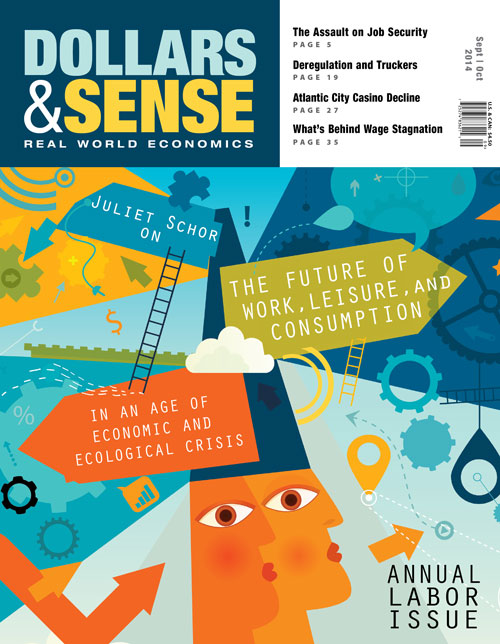Fighting Climate Change in Portlandia
Not only is failure not an option, those fighting to avert cataclysmic climate change have achieved important successes worthy of celebrating.

We have finally sent our September/October 2014 Annual Labor Issue out to e-subscribers (print subscribers should get it within a week to ten days). And I just posted our cover story to the website, The Future of Work, Leisure, and Consumption in an Age of Economic and Ecological Crisis, which is an interview with economist and Boston College sociology professor Juliet Schor.
Here is the editors' note from p. 2 of the issue:
As economist Juliet Schor points out in our interview, the American way of work, leisure, and consumption has changed over time—and not in little ways. The U.S. labor movement was historically ahead of Europe’s in the fight to shorten the working day. Until the Second World War, the rich capitalist countries were on a common trajectory of declining work hours. It’s only since then that the United States has diverged from that path. If these patterns have changed before, under particular historical circumstances, however, they can change again, under different circumstances. A new and better way of life—greater leisure, greater equality, more economic security, and greater environmental sustainability—is still possible.
As for the ongoing decline of U.S. labor, the story can’t be reduced to the impacts of globalization. Labor writer and activist Dan LaBotz explains what’s happened to labor in U.S. trucking over the past few decades: shrunken and weakened unions, declining wages, and long work hours (not all of them paid). Sound familiar? But trucking, unlike manufacturing industry, is not impacted directly by import competition or global sourcing. The changes in labor relations in the industry have been caused by changes in domestic labor relations and regulatory policy, among other things. That casts the effects of globalization (better said, “neoliberal” or “corporate” globalization) in a new light—as part of a larger story in which employers have succeeded, by various means, in tilting the balance of class power dramatically in their favor.
Cities are building new sports facilities, convention centers, and tourist attractions in search of post-industrial futures. Tourism and entertainment were supposed to be new growth industries that would make up for the loss of manufacturing jobs. Across the country, casino-gambling initiatives keep getting put on the ballot, basically with one promise—jobs. But according to economists Ellen Mutari and Deborah Figart, anyone looking to casino gambling as the future needs to take a hard look at Atlantic City’s present. Casinos are closing, the city’s casino employment has been declining for the better part of two decades, and casino workers are facing the same familiar erosion of wages, job security, and working conditions.
The “conventional wisdom,” at its core, has an air of fatalism: The fault supposedly lies in the inexorable rise and fall of this or that industry, in disembodied global tides beyond our control, or—worst of all—in our own unchangeable natures. Wrong on all counts. The changes that created the world we know were wrought by human beings. The hard, messy, conflictive process of creating the future, too, will be the labor of human beings.
If you don't subscribe to Dollars & Sense, we hope you will. (Click here to subscribe to the print edition or the electronic edition.) If you subscribe today, we can send you the Annual Labor Issue as a bonus issue.
--Chris Sturr